
News
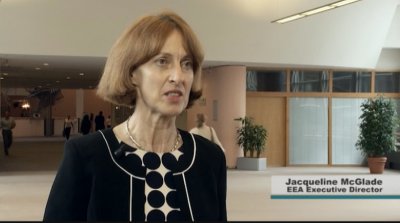 Jacqueline McGlade, Executive Director of the European Environment Agency, is a marine biologist and an environmental informatics professor. She answers questions on the major threats to the oceans and what we can do about them. The questions were put together by Mundus maris asbl as a result of a public consultation. The interview is the first in a series of interviews with personalities in the sciences and arts sharing their views on why it is important to protect the oceans and what can be done to do it more effectively. Click on the photo to see the interview on the Mundus maris channel.
Jacqueline McGlade, Executive Director of the European Environment Agency, is a marine biologist and an environmental informatics professor. She answers questions on the major threats to the oceans and what we can do about them. The questions were put together by Mundus maris asbl as a result of a public consultation. The interview is the first in a series of interviews with personalities in the sciences and arts sharing their views on why it is important to protect the oceans and what can be done to do it more effectively. Click on the photo to see the interview on the Mundus maris channel.
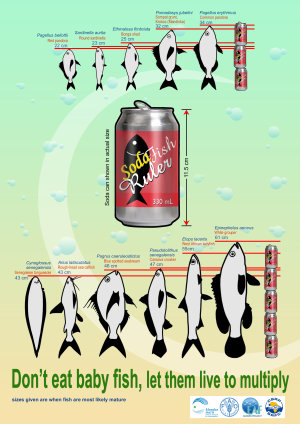 Widespread fishing of baby fish is a scourge that contributes to reducing world-wide production of fish and fishery resources caught in the wild by an estimated 700,000 tonnes each year since the early 1990s. Fishing baby fish happens to a large extent as a result of shrimp fisheries. They take out up to 80% of so-called 'by-catch', dead and dieing juveniles of other valuable species, which happen to be in the way of the trawl. They have little or no commercial value at that size and are thrown overboard. This is a tremendous waste, because they will never grow to a size where they can reproduce themselves and keep their population healthy and productive. Any fishery with too small mesh sizes or hooks operating in areas with lots of baby fish is very destructive. It affects also the once rich fishing grounds in Northwest Africa. The FAO - EAF Nansen pilot activities implemented by Mundus maris aim at promoting an ecosystem approach to fisheries by introducing the key concepts of ecosystem integrity and protecting people's livelihoods already at an early age in schools in Senegal and Gambia. The fish ruler poster - here for Gambia - uses wide-spread soda cans as a measure to draw attention of the minimum size at which overfished species will have multiplied, thus ensuring the sustainability of the resource base. Read more.
Widespread fishing of baby fish is a scourge that contributes to reducing world-wide production of fish and fishery resources caught in the wild by an estimated 700,000 tonnes each year since the early 1990s. Fishing baby fish happens to a large extent as a result of shrimp fisheries. They take out up to 80% of so-called 'by-catch', dead and dieing juveniles of other valuable species, which happen to be in the way of the trawl. They have little or no commercial value at that size and are thrown overboard. This is a tremendous waste, because they will never grow to a size where they can reproduce themselves and keep their population healthy and productive. Any fishery with too small mesh sizes or hooks operating in areas with lots of baby fish is very destructive. It affects also the once rich fishing grounds in Northwest Africa. The FAO - EAF Nansen pilot activities implemented by Mundus maris aim at promoting an ecosystem approach to fisheries by introducing the key concepts of ecosystem integrity and protecting people's livelihoods already at an early age in schools in Senegal and Gambia. The fish ruler poster - here for Gambia - uses wide-spread soda cans as a measure to draw attention of the minimum size at which overfished species will have multiplied, thus ensuring the sustainability of the resource base. Read more.
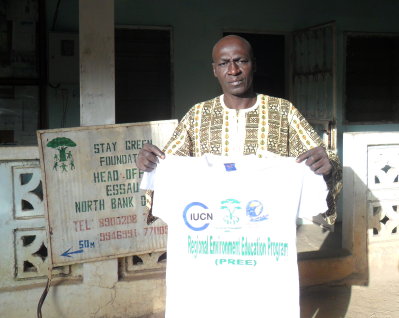
The project about developing and testing teaching modules on marine ecosystems in pilot schools in Senegal and The Gambia is gaining momentum. Mundus maris, in collaboration with experienced local partners, Stay Green Foundation in The Gambia and UNI.V.ERE in Senegal, is developing a teaching aid kit, which will be tested in the first quarter of 2012. Five schools in Hann and Kayar (Senegal) and four schools in Gunjur and Tanji (The Gambia) will participate. The collaboration takes place in the context of pilot activities supported by the FAO's EAF Nansen project. Read more.
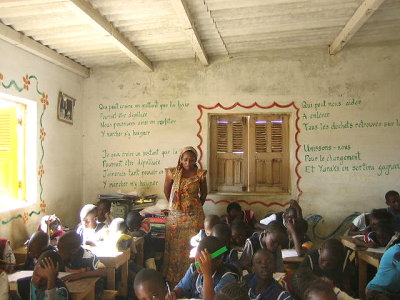 The Khadim School in Hann, Senegal, is actively involved in pilot activities in the framework of the FAO - EAF Nansen project aimed at testing teaching aids to support the introduction of ecological concepts into the curriculum, such as marine ecosystems approaches to sustainable fisheries. It thus provides concrete experimental opportunities relevant also to the efforts of the Regional Programme for Environment Education (PREE), which engages IUCN together with the ministries of education of seven NW African countries. The school has a track record of working on environmental themes, even before they received wider official recognition. Examples are some earlier efforts, such as beach clean up and drawing attention to the pollution from untreated waste from Dakar provoking unhealthy conditions in Hann Bay. These are illustrated in the article on the FAO - EAF Nansen project. For the profile of the school itself, read more.
The Khadim School in Hann, Senegal, is actively involved in pilot activities in the framework of the FAO - EAF Nansen project aimed at testing teaching aids to support the introduction of ecological concepts into the curriculum, such as marine ecosystems approaches to sustainable fisheries. It thus provides concrete experimental opportunities relevant also to the efforts of the Regional Programme for Environment Education (PREE), which engages IUCN together with the ministries of education of seven NW African countries. The school has a track record of working on environmental themes, even before they received wider official recognition. Examples are some earlier efforts, such as beach clean up and drawing attention to the pollution from untreated waste from Dakar provoking unhealthy conditions in Hann Bay. These are illustrated in the article on the FAO - EAF Nansen project. For the profile of the school itself, read more.
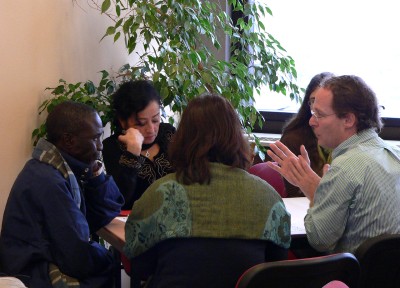 Welcome to the workshop 'Learning, teaching and practising - together - sustainable development'! What do young people need to know? What do they need to be able to do? What should they value enough to act upon when they graduate into adult life? What can we to together to be fit for the transitions and huge challenges of our societies? Considering that we have to feed and house 9 billion people by 2050, produce four times more energy while decarbonising our economies? Revert the impoverishment of the oceans, which lost more than 90% of their big species in the last century in the North Atlantic alone. These were key questions participants from Europe, Africa, Asia and Latin America discussed upon invitation of Mundus maris on 2-3 March 2012 at the Free University of Brussels. The wealth and diversity of past experiences shared by the participants opened new insights and a strong sense of togetherness and trust. New joint activities are on the cards. Read more.
Welcome to the workshop 'Learning, teaching and practising - together - sustainable development'! What do young people need to know? What do they need to be able to do? What should they value enough to act upon when they graduate into adult life? What can we to together to be fit for the transitions and huge challenges of our societies? Considering that we have to feed and house 9 billion people by 2050, produce four times more energy while decarbonising our economies? Revert the impoverishment of the oceans, which lost more than 90% of their big species in the last century in the North Atlantic alone. These were key questions participants from Europe, Africa, Asia and Latin America discussed upon invitation of Mundus maris on 2-3 March 2012 at the Free University of Brussels. The wealth and diversity of past experiences shared by the participants opened new insights and a strong sense of togetherness and trust. New joint activities are on the cards. Read more.







